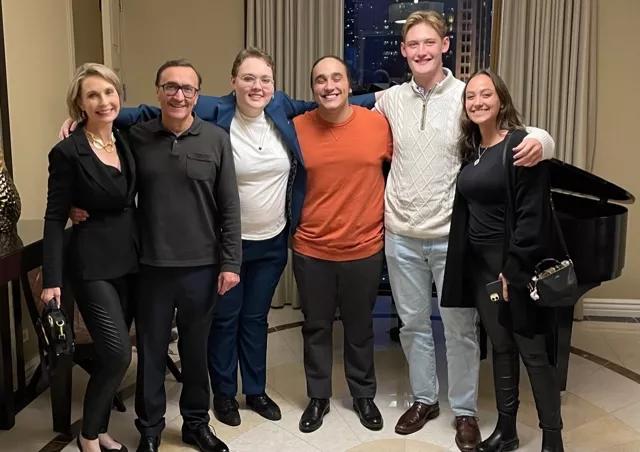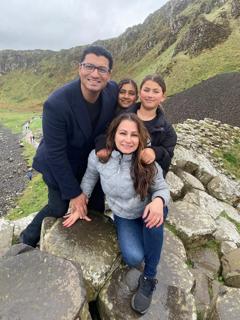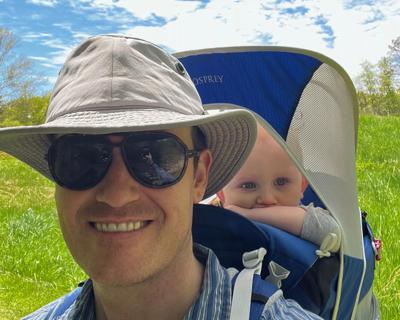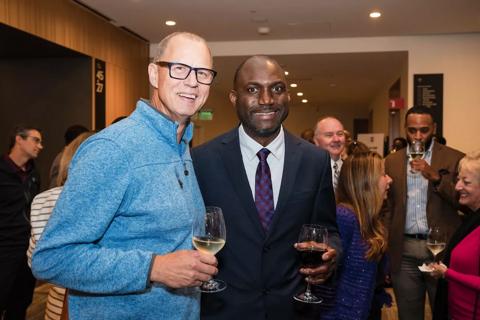Emily E. Volk, MD, MBA, FCAP (ACLPTH ’98), is Vice President of System Pathology and Laboratory Services at UofL Health in Louisville, Kentucky. She recently completed two years as Vice President and Chief Medical Officer of Baptist Health, Floyd, in New Albany, Indiana. She is an associate professor of pathology at the University of Louisville School of Medicine, and the President of the College of American Pathologists.
Advertisement
Cleveland Clinic is a non-profit academic medical center. Advertising on our site helps support our mission. We do not endorse non-Cleveland Clinic products or services. Policy
Q. What led you to a career in medicine?
A. My mom was a nurse and my dad was a physician, and honestly, I didn’t understand how anybody made a living outside of healthcare. Truly, I was practically conceived to go to medical school; crazy as it sounds, my parents met when they were both working at General Hospital in Kansas City after a patient safety event. There was a new medical school coming up at the University of Missouri in Kansas City (UMKC). The folks there were creating a six-year baccalaureate MD program back in the late ’60s. My parents got married around the time that program was being organized. My first memories of any discussions about what I would be when I grew up always revolved around becoming a physician, going to medical school. As a kid, I used to go on hospital rounds with my dad, an obstetrician/gynecologist. When I was in third grade, my dad brought home a placenta for me to take for show-and-tell. (These were the days of more lax hospital rules.). What came with that show-and tell-was a detailed discussion of what exactly a placenta is. This obviously had some other implications around the birds and the bees. So, my Mom did take a few phone calls from other parents that evening.
As it turned out, I did end up attending UMKC school of medicine six-year program after I graduated high school. The combined BS/MD program is designed for very motivated young people who are reasonably sure of what they want to do careerwise. One of the reasons the program was developed was to improve access to physicians, especially in rural Missouri. We had a wonderful pathology professor, Dr. Ed Friedlander. He was such a dynamic teacher that a number of us in my graduating class (1993) entered the field. Without Dr. Friedlander, we might have pursued more classically patient-facing clinical specialties. He made pursing anatomic and clinical pathology seem so appealing, always emphasizing how getting the right diagnosis and accurate laboratory test results was critical to nearly every patient. He showed us that pathologists were clinicians creating the foundation for modern medicine.
Advertisement
Q. What drew you to Cleveland Clinic for your residency?
A. At my medical school, there were a number of Cleveland Clinic alumni who were on the faculty, including Dr. Christopher Sirridge (IM’81), a medical oncologist who trained at Cleveland Clinic and encouraged me to apply knowing that Cleveland Clinic had (and still does) a marvelous anatomical clinical pathology residency program. The fact that there was a high-volume surgery program and cutting-edge internal medicine and specialty care for patients with more routine illnesses to pretty esoteric conditions meant that we had a terrific learning environment for budding anatomic and clinical pathologists.
Q. What’s your favorite memory at Cleveland Clinic, and who were your mentors during your training there?
A. When I was there from 1993 to 1998, Dr. William Hart (Staff’07) was the Chairman of Anatomic and Clinical Pathology, and Dr. Jonathan Myles (ACLPTH’87) was our residency Program Director. It’s really amazing that today, Dr. Myles and I serve together on the Board of Governors of the College of American Pathologists. Dr. John Goldblum (Staff’93) also was an important mentor. I did a certifying year in gastrointestinal pathology with him. I also spent additional time on the transfusion medicine service with Dr. Gerald Hoeltge (LMED’75) and Dr. Ronald Domen (Staff’93). One of my absolutely favorite memories is our Blood Bank didactic lectures from Dr. Hoeltge when we were on our transfusion medicine rotation. He would have two or three residents of different levels whom he would invite into his office. He would sit us down, and he would serve tea. It seemed very luxurious, in the middle of the day, to have a cup of tea with Dr. Hoeltge. I still buy the tea, and I think of him every time I buy it – Celestial Seasonings Bengal Spice. I remember the warm feeling that his office sanctuary provided and the wonderful flavors of the tea that added to this sense of hospitality and generosity. He is so brilliant and such a tremendously gifted teacher. He would take a blank piece of paper on a large flip board and fill it up – seemingly off the top of his head – with marvelous explanations, drawings, and details of how different antigens and antibodies came to be discovered, how different tests worked, or risk factors and things to consider in transfusion medicine. It just came pouring out of him. He also used the Socratic method and asked us really good questions that engaged us. Although it was a didactic session, it was very interactive and very rich.
Advertisement
Another mentor was Dr. Wilma Bergfeld (D’68). When I started in the early ’90s, there were not a lot of women in positions of influence, and she was one of them. Just her presence, her charisma, made such an impact on me. She was always professional, warm and very kind. She also helped present a successful example of a physician-to-physician marriage, which I was getting ready to enter into. That had an impact – the fact that she and her husband, Dr. John Bergfeld (S’67, ORS’70), clearly treated each other as equals set the bar for me as to what that partnership should look like. Another very strong woman whose path I noticed was Dr. Mindy Estes (ACLPTH’84), a neuropathologist who was working on her MBA when I was a resident and, at the time was moving up the ranks in hospital administration. She’s been a marvelous success in hospital administration and is now back in my hometown of Kansas City [as President and CEO of Saint Luke’s Health System]. I’d love to run into her again and thank her for being a role model.
Q. What’s a work-related accomplishment of which you are most proud?
A. I’m especially proud of being able to be a working pathologist and being able to contribute to hospital operations and medical administration. I’m also very proud of being able to serve the pathologist community as President of the College of American Pathologists. With approximately 18,000 members, we are the largest organization of board certified pathologists and we serve patients worldwide by accrediting thousands of laboratories interested in pursuing the highest-quality standards.
Advertisement
Q. What do you enjoy outside of work?

Image content: This image is available to view online.
View image online (https://assets.clevelandclinic.org/transform/ee131b8b-cad4-498c-a7a1-94b4081acd9a/Dr_-Emily-Volk-group-shotIMG_0423_jpg)
Dr. Emily Volk with her husband and their children. From left, Dr. Volk, Dr. Dan Mais, Diana Truumees; David Mais; David Truumees; Sarah Mais
A. I like to play the piano. I play mostly for myself, but I enjoy practicing. I love listening to music and enjoy playing golf with my husband, Daniel Mais, MD, who is a professor of pathology at the University of Louisville. We have four children between us, David, 20; David, 21; Sarah, 24; and Diana, 24. We each brought a boy and a girl into our marriage nearly two decades ago. The fact that our kids really enjoy each other helped us come together as a family. This is a great blessing. Dan and I love to travel with the whole family.
Q. What motivated you to serve on the Cleveland Clinic Alumni Board?
A. Having done my residency at Cleveland Clinic has really set me up for success in my career. I saw participating on the Alumni Board as an opportunity to give back, show my appreciation and become a more involved booster for the organization.
Q. Is there any advice you would like to share with future alumni?
A. I would just say, “Know how impactful it is to be affiliated with Cleveland Clinic. It comes with great prestige and that can be very powerful as physicians advocating for our patient. It also comes with some responsibility. In the world outside of the Cleveland Clinic, I want to represent Cleveland Clinic well and make the organization proud.”
Advertisement
Advertisement

Honoring Exceptional Achievement, Service and Leadership

We celebrate the exceptional achievements of four future alumni

Honoring Exceptional Achievement and Leadership

Meet Hardeep Phull, MD (CCLCM’11)

Meet William Tierney, MD, MS (CCLCM’16, OTO’18)

Meet Samuel Omotoye, MD (CARD/E'15)